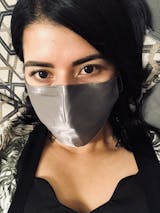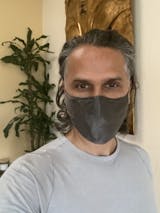Have you ever tried retinol in your skincare regime but found it to be a little too harsh for your sensitive skin? You're not alone. Those who suffer from sensitivities can't always use retinol, which means they miss out on all the benefits. But in this article, we'll show you six gentle and effective alternatives to retinol for even the most delicate skin.
Throughout history, humans have always invested in treating their skin, putting almost anything on their faces and bodies to look their most radiant and youthful.
Geishas would smear bird poop across their faces; Victorian women lightened their skin with arsenic (1). Today, people get one of the most toxic ingredients known to man injected into their face regularly (2) — all in the name of beauty.
The anti-aging skincare market is full of weird and outrageous practices and ingredients, as women and men worldwide strive for the smoothest, youngest, most flawless-looking skin.
For centuries, we have been damaging our skin daily through dangerous formulations, like lead and radium in makeup throughout the 18 and 1900s (3); following unsafe practices, like sun-bathing slathered in Crisco, which was popular in the 70s and 80s (4); and using now banned medications, like Accutane, to treat severe acne.
In recent decades, the beauty industry has only begun to focus on ingredients and treatments that protect the skin. For example, SPF was only invented in 1932 with an SPF rating of just 2. SPF 30 was developed in 1974 — more than forty years later. So for centuries, right up until just 50 years ago, we were predominantly relying on wearing protective clothing and shade to protect our skin from the sun, which hasn't always been the most practical way.
In the 1980s, scientists invented the first anti-aging skincare product using tretinoin, or retinoid, an ingredient used for treating acne since the 1940s. Retinoids have grown more and more in popularity, as people everywhere have found them to be an effective treatment for fine lines, wrinkles, hyperpigmentation, and smoothing skin's texture.
This effective ingredient sounds too good to be true, and for many of us, it is. For there has always been one troublesome side effect to using retinol, and that is: skin inflammation.
Retinol can cause redness, dryness, peeling, skin sensitivity. It can damage the skin's microbiome on a microscopic level, which is imperative to its health. Regardless of these side effects, retinol is still one of the most popular ingredients consumers look for in their skincare.
The Clean Movement
So let's talk about the movement the beauty industry is currently going through. You only have to watch your favorite influencer or celebrity to see that clean, sustainable, and natural are trending hard. We're all looking for a healthier and happier life, which means eating better, staying active, and looking after our skin and body. Some of the most recent trends within this movement are:
- Celebrities like Pamela Anderson and Victoria Beckham have removed their breast implants to improve their health (5).
- Minimal skincare formulations and regimes are in vogue because of the health benefits, financial gains, and environmental advantages. Take DEW MTY's all-in-one Bloom Jelly Serum Bar, for example. The waterless formula contains highly effective, sustainably sourced ingredients, making the serum bar soft on the skin and the planet.
- Natural ingredient alternatives are also on the rise, such as fruit enzymes in place of synthetic AHA's, like the Hawaiian Beauty Water by Honua Skincare.
So it's no surprise that some people are now waging war against synthetically-made, inflammation-inducing retinol.
What Are Retinols?
Before we move on, let's quickly go over what retinol is. Retinol is often labeled as something different and is a derivative of Vitamin A. Other variations are retinyl acetate, retinyl palmitate, all-trans retinoic acid, tazarotene, retinaldehyde, adapalene, tretinoin, isotretinoin.
Vitamin A is essential for human reproduction and development, helps maintain good vision and healthy skin, and effectively treats acne by promoting cell turnover in the skin. This also helps with signs of aging and pigmentation, making it a very active and effective chemical.
You may have heard of Accutane. It was discontinued in the US about a decade ago. This oral drug treated extreme cases of acne and contained a strong dose of isotretinoin. Throughout the treatment (around 16-24 weeks), it would gradually destroy the sebaceous glands' ability to produce sebum. This, in turn, stopped any acne from forming.
It also stopped the skin from being able to produce oil, drying it out in excess, often causing flaking and cracked skin—yikes. And could also cause deformities in a fetus if women used the drug while pregnant—double yikes.
This is an extreme example of retinoids, and it's easy to see why it was discontinued. Retinol as a topical treatment in skincare is far less intense, and you can get different levels of retinol in your skincare products. However, as mentioned earlier, many skincare professionals now claim that retinol should not be used in skincare at all.
As Dr. Barbara Sturm (6), German orthopedic surgeon-turned-esthetician, puts it:
"I don't believe in attacking the skin and forcing healing and repairing every time, and I don't think retinol should be in skincare products you can buy in stores. My approach is respecting the skin as our largest organ with so many necessary functions, including our immune system, and staying away from aggressive ingredients."
Your Skin Type
There are four basic skin types:
- normal
- oily
- dry
- combination
Your skin type is determined by genetics and can be managed—but not necessarily changed—with a good skincare regime.
After determining your skin type, your skin may also experience conditions or symptoms, such as acne, sensitivity, rosacea, dehydration, and signs of aging.
So let's say you have dry and dehydrated skin that is sensitive and also prone to acne. You might want to reach for a retinol serum to treat the acne and fine lines, which would likely be an effective ingredient in doing that. However, your dry and sensitive skin may likely suffer as a result, as the retinol can cause further irritation to already inflamed skin.
As mentioned earlier, pregnant women should also avoid vitamin A-derived ingredients, which can interfere with the pregnancy and cause deformities in the fetus.
So what if you have dry, sensitive skin, and you're also pregnant but want to reap the benefits of retinol? Luckily for you, there are plenty of natural alternatives to retinol popping up on the market that are safe for pregnancy and do not cause any inflammation. Here are just a few:
Bakuchiol. Found in the seeds and leaves of the Psoralea Corylifolia plant, this botanical extract boasts the same benefits as retinol, without irritation.
We recommend: Honua Aloha Youth Serum hydrates, smooths, brightens, and tightens. This carefully curated blend will boost skin immunity by providing the nutrients needed for a youthful glow. A unique formula that penetrates quickly into the skin delivering concentrated nutrition, leaving skin fresh and dewy.
Frankincense. This oil increases cell turnover and gives skin a youthful, radiant appearance. Fine lines, wrinkles, and pores are all minimized.
We recommend Silk Premier Cleansing Oil for skin healing and repair. Frankincense oil balances sebum production, fades scarring, and lifts and tightens skin for a refreshed complexion. Follow this with your favorite moisturizer and Farizad's Veil Sun Reflector scoop with ingredients like non-nano zinc oxide, aloe, and frankincense to protect and treat the skin.
Rambutan. This has gained recent popularity as it aids in developing, repairing, rejuvenating, and maintaining tissues and cells. Rambutan is also high in antioxidants called flavonoids, which have anti-cancer and anti-inflammatory attributes.
We recommend Hero SkinFit Serum as it reduces fine lines, smooths, and tightens skin in weeks. This product extracts nepheline from the Rambutan Seed peel (Nephelium lappaceum) via a new Sub-critical Water Extraction (SWEX) method that yields high-performance extracts.
Rosehip oil. Rosehip has been around for thousands of years in skin care, and there is a good reason for it. It hydrates, moisturizes, brightens, exfoliates, boosts collagen, protects against sun damage, reduces pigmentation, and helps minimize fine lines; it's also an anti-inflammatory.
We recommend Marina Biome Brightening Ampoule. It harbors highly-concentrated adaptogenic oils that vigorously brighten and balance for an even, radiant complexion. It works at a deep level, optimizing the skin's delicate microbiome to quickly and noticeably improve the look of overall skin health.
Carrot Seed Oil. This is not only high in carotene, which is excellent for skin and eyesight, it is also an anti-inflammatory and anti-aging, antifungal, antibacterial, and is a strong antioxidant.
We recommend Aura Facial Oil. It contains plant oils chosen for their regenerative properties to brighten and improve skin texture and complexion. This fast-absorbing, lightweight facial oil is a treat for the skin and has a delicious blood-orange scent. Use it as a day or night oil.
Red Algae Astaxanthin. One of nature's most potent antioxidants. It builds collagen and rehydrates the skin, giving skin a more radiant appearance while simultaneously neutralizing free radical damage, and also works as a blue-light blocker.
We recommend Helios Anti-Pollution Youth Ampoule. It's almighty ambrosia brimming with ultra-reparative Plant Stem Cells and a fountain of youth-preserving Red Algae Astaxanthin. Unparalleled in strength for combating pollutants and daily skin stressors, this liquid gold ampoule is a godsend for skin needing aftersun replenishment, defense against the elements, and thriving barrier function.
The Problem with Natural
There is another thing to consider when deciding whether to use a natural alternative to retinol. Particularly if you don't have any adverse reactions to using retinol and you are not pregnant.
The problem with going with more natural alternatives is, it opens up another area of concern. Sourcing natural alternatives give greater risk to unsustainable practices. Overharvesting is an issue, and the conditions the farmers and workers experience are more likely to be exploitative. This includes increased risks of child labor.
The only way to know that the brand you're buying your skincare from is ethically and sustainably sourcing their products is to do your research. The information should be readily available on their website or their packaging. If it isn't, and you need to search for this information, you might want to think twice before buying.
Transparency in the beauty industry has become an essential part of a brand's core values. If a brand is not entirely open about their ingredients, how they source, and where they source from, their standards are likely not high enough—not in our opinion, anyway.
Not for Everyone
It's important not to follow trends just for the sake of following trends. It's also important not to disregard an ingredient just because it doesn't work for someone else or you read an article that goes against it.
Retinol works, but you must use it according to the instructions, and even then, it might not work as intended. Test patching ingredients or trialing them before you go hard using them is the best way to know if something works for you. Or, if you're uncertain, try one of the gentle and effective retinol alternatives we have recommended in this article.
Emma Jade has been a trained esthetician for over 15 years. She is a sustainable skincare writer, educating and building awareness around proper skin health that doesn't cost the earth.
Some of the products promoted in our blog are from our online store. Many others are brands we have researched and found to be great examples of sustainable, ethical, and innovative brands in their field, and we don't profit from mentioning them in our blog. #CollaborationOverCompetition
References
1. https://www.ranker.com/list/weird-skincare-ingredients/dianapaz
2. https://theconversation.com/handle-with-care-the-worlds-five-deadliest-poisons-56089#:~:text=Scientists%20differ%20about%20the%20relative,kilogram%20can%20kill%20a%20human
3. https://the-delve.com/2019/02/26/radioactive-makeup-that-could-kill-you/
4. https://cyantificskincare.com/blogs/my-journey/sunbathing-and-skin-care-in-the-1980s-tales-of-baby-oil-and-crisco
5. https://www.center4research.org/celebrities-removing-breast-implants/#:~:text=Besides%20health%20problems%2C%20some%20celebrities,their%20implants%20for%20this%20reason
6. https://www.refinery29.com/en-us/2021/01/10266732/dr-barbara-sturm-skin-care-advice










